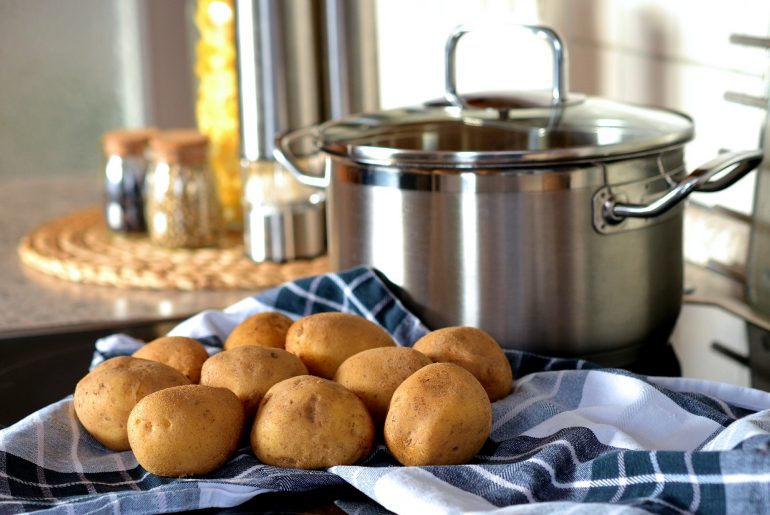Potato problems?
Potatoes may seem basic, but there are a lot of ways to mess them up. Whether they come out partly raw, mushy, or generally flavorless, the good news is there is usually a simple solution. Read on and see what you might do differently next time to achieve those perfectly tender, flavorful spuds you salivate over.
You don’t choose the right potato for the job.
You’ll come across more than a dozen different kinds of potatoes at the grocery store, so how do you know which will work best for your recipe? Well, a good rule of thumb is to use russet potatoes for baking or steaming, and use red or gold potatoes for roasting or sautéing. Russets and yellow potatoes are best for mashing. Round red potatoes and fingerling potatoes are best for boiling. Not sure what to use? Those round white potatoes that you see at just about any grocery store will probably do the trick.
Also see: How to keep potatoes from turning brown.
You bring potatoes to a rolling boil.
Boiling potatoes on a full boil can leave you with a raw interior and an overcooked exterior. Yes, a full boil means potatoes will cook faster, but it’s not the best method.
To make them properly, simmer (cut or uncut) potatoes for a 12-15 minutes, depending on size of potatoes. Potatoes are done when you can pierce them easily with a fork. Use this technique for making mashed potatoes or potato salad.
You don’t salt the water.
Salting the water prevents you from ending up with a bland finished product. If you don’t salt the water, seasoning will be an uphill battle.
You overwork mashed potatoes.
Mashed potatoes are one of the most delicious comfort foods on the planet. But when you get a lump of gluey potatoes on your plate, they can be anything but. The first step to perfect mashed potatoes: choose a starchy potato like a russet or an all-purpose variety like a Yukon.
Here’s how all your favorite celebrity chefs make mashed potatoes.
Start your potatoes in a large pot of cold water, then turn up the heat. Cook for 12-15 minutes on a medium simmer. Once water begins to roll, salt the pot really well. When potatoes can be easily pierced, they’re done. Drain the pot, return potatoes to hot pot, and add other ingredients. Gently mash them together until they’re just as you like them — but be careful not to overwork them, or you’ll have gluey, unappetizing potatoes, once again.
You don’t season your spuds.
Let’s face it. Potatoes themselves aren’t mind-blowing — it’s what you do to them that makes them amazing. Season with salt, pepper, thyme, rosemary, or just about anything else you can think of. Just don’t forget!
You make your sweet potatoes too sweet.
Dessert is dessert, and potatoes are potatoes. Keep it that way. Ditch the high-calorie seasonings like marshmallows (unless it’s a special occasion and you insist). Sweet potatoes are already sweet. Use a little cinnamon and maybe a dollop of maple syrup to highlight their natural sweetness. Or use other toppings entirely.
You burn your roasted potatoes.
Here’s a trick: Throw a good amount of salt on your sheet pan (like, 1/4 inch deep), then place potatoes atop your bed of salt. The salt will prevent potatoes from sticking or burning, plus it adds a nice, lightly crispy texture.
You use cold ingredients.
Making mashed potatoes? Melt your cream and/or butter in a side sauce pot. Cold ingredients work, but you’re lowering the temperature of your dish immediately — and it will only get colder from there.
You mess with your hash browns too much.
Poking those potato shreds around the pan is pretty tempting — but resist! Move your hash browns too much and they won’t have time to caramelized and crisp.
Start by shredding spuds (russets work best here) in cold water, then drain. Heat butter or oil in pan, then add shreds in an even layer. But don’t move them for 5 to 10 minutes. Season then flip in sections and season again. Cook until they’re at your preferred level of crispiness.
You add potatoes way too early to your soup.
If you want your potato to hold its shape in a soup or stew, start by selecting a potato that’s up to the challenge. Waxy red potatoes are perfect for the job. Then, don’t be too eager to add them in. Hold off until the last hour or so off cook-time. You’ll have perfectly cooked bits of potatoes without having to worry about them turning to mush.
You don’t store potatoes properly.
Potatoes are famous for their long shelf life, however, poorly stored potatoes can sprout and mold with the best of them.
Store potatoes in a cool, dark room (45-55ºF is ideal). Basements typically work pretty well. Fridges can wreck havoc on potatoes flavor and texture, so only go the route if you absolutely must — then make sure to bring potatoes to room temperature before cooking. Never wash potatoes until you’re ready to use them.
ALSO SEE: Sweet potato chipotle hummus recipe.




